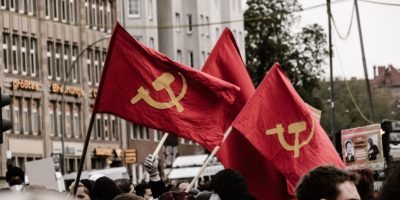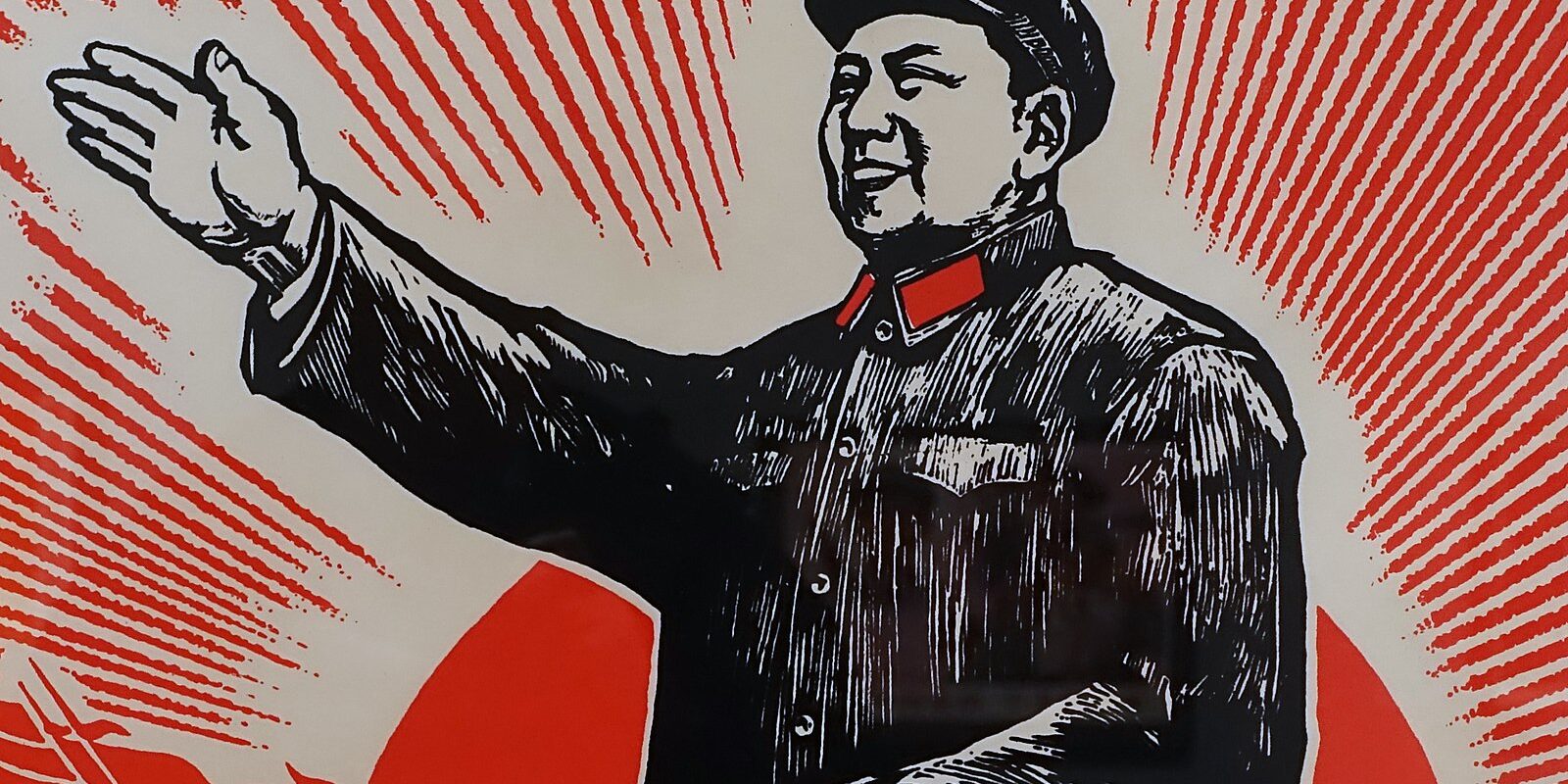by Michael Rectenwald
[This piece is an excerpt from Chapter 13 of The Great Reset and the Struggle for Liberty: Unraveling the Global Agenda, to be released January 10, 2023.]
This chapter derisively refers to the notorious Great Leap Forward (1958–1961) as the Great Leap Backward. But China’s Great Leap Forward is not the ultimate object of my scorn. That scorn is reserved for the contemporary project conducted by people, who, if they knew anything about history, or cared about its results, would never propose this treacherous and potentially world-devastating campaign called the Great Reset—unless their intentions are evil and not merely misguided.
Meanwhile, I’m not the first to think of this appellation in connection with Mao’s Great Leap. That distinction may be held by a Soviet critic of Mao’s quixotic strategies. In an article entitled “The Great Leap Backward,” one A. Khan’kovskiy treated the Great Leap Forward as a major deviation from the “successful” Soviet socialist system that had followed “the Great October Socialist Rev0lution.”1
According to the Soviet writer, Khan’kovskiy, the Soviets had undertaken their glorious revolution under unfavorable conditions. They had established a socialist state against “the united front of the imperialist powers.”2 (Meanwhile, the Soviets were launched and kept afloat by Western—especially U.S.—financing and technology.3) In spite of these difficulties, the Soviets had set the standard and vouchsafed to the Chinese a blueprint and model that it might follow. In the case of China, “[t]he gigantic might of the Soviet state was on its side.” The Chinese benefitted from Soviet support as the Soviets treated the Chinese like a doting parent would its child. They had sent manpower, intelligence, material supplies, and money:
Our country gave China economic and political aid: For many years an entire army of Soviet specialists—over 10,000 people—worked in China. They helped build factories, automotive vehicle, tractor and machine building plants, electric power stations, radio stations, mines, bridges (the famous bridge across the Yangtse) River, highways . . .4
Even American politicians had acknowledged the Soviet Union’s largesse. According to Khan’kovskiy, a joint commission of the U.S. Congress wrote in a two-volume treatise on the Chinese economy: “‘history is unaware of a similar example in which a country [the Soviet Union] would offer on a plate an entire industrial system.’”5
With Soviet assistance and funding, the Chinese began to trudge the road of happy destiny. In the first several years since the establishment of the Chinese People’s Republic, Chinese economic output had increased by several factors. From 1949 to 1957, as noted by the U.S. congressional commission, the index of industrial production of the Chinese People’s Republic rose by over 400 percent. China was on track to become another “successful” socialist state. For China, “[a]ll possibilities existed for a progress toward communism, following the true and tried way laid by the Great October Revolution.”6
Mao’s Early Career
In addition to the Soviet Union’s aid to Communist China, Mao benefitted personally and politically from Western and Eastern European assistance. Mao had been supported in his early communist career by Yale University vis-à-vis Yale-in-China.7 As Jonathan Spence, a professor of Chinese history put it:
In 1919, Mao, aged 26, was in Changsa, having his middle school education. He visited Peking and while there received his . . . serious introduction to communist theory in Li Ta-chao’s Marxist Study Group. Now, if he was to develop a reputation in socialist circles, he had to find a forum to propagate his views . . . At this crucial point the student union of Yale-in-China invited Mao to take over the editorship of their journal.8
The Yale Daily News noted that Mao accepted the offer. With Mao at the helm, the paper would now be refocused to include social criticism of contemporary issues and work toward “thought reorientation.”9
After studying Marxist theory in Peking, Mao moved to Shanghai, where he met Ch’en Tu-hsiu, who later became the Communist Party leader. Ch’en instructed Mao to form an area branch of the party in Peking, but Mao found that he lacked the funds. Yale-in-China intervened again. Spence noted that “Yale-in-China agreed to rent him three rooms, which Mao named his ‘culture bookshop.’” Business boomed as Mao rang up “high sales” with such titles in Chinese as “An Introduction to Marx’s Capital,” “A Study of the New Russia,” and “The Soviet System in China.” Mao established branches of his bookstore and from the profits was able to establish several socialist youth corps and fund the Communist Party. Due to his success, Mao was chosen as one of the delegates to the First Congress of the Chinese Communist Party at Shanghai in 1921. “From there it was only a small step to becoming one of the founders of the Communist movement in his country.”10 . . .
Mao’s Leap into Madness
Khan’kovskiy suggested that Mao’s voluntarism11 soon got the better of him. The 8th Congress of the Chinese Communist Party was held in 1956. The Congress approved the proposals for the second Five-Year Plan for 1958–1962. “There was no question of any adventuristic ‘leaps’ or of ‘communes.’”12 But the Maoists dismissed this original plan as Mao decided to accelerate development radically. “The Maoists simply threw it overboard, replacing a more or less efficient program with high sounding phrases of ‘great leaps’ and ‘red banners.’”13
A second session of the 8th Congress of the Chinese Communist Party was convened in May 1958. At this convention, Mao introduced his new revolutionary scheme. “The shrieking slogan which all of Mao’s stooges soon began learning by rote was: ‘By tensing all our forces, by striving forward, let us build socialism on the principle of more, faster, better and more economically!’”14 Mao aimed “to have China reach the production levels reached by the capitalist countries in the course of 100 to 200 years, in 10–20 or even less years.”15
The Great Leap Forward was an attempt to increase crop yields dramatically and to industrialize the countryside—to make local communities self-sustaining while increasing agricultural and industrial yields for the state. To accomplish these feats, the peasants were reorganized into massive communes of thousands and even tens of thousands, where all resources were communally shared, including food. Private ownership of land and free trade were abolished, along with the right to leave the collective.16 To avail women for farming, communal dining halls were established. With women working the communal farms, many men were likewise made available for small-scale “industrial” production. Communes were instructed to produce steel in homemade, backyard furnaces. A massive campaign to collect metal tools to transform everything into steel was conducted. Khan’kovskiy mockingly described this effort:
The Maoists intended to catch up with Britain by creating thousands and thousands of dwarf blast furnaces. It has been described already how everywhere, in cities and villages, on squares, streets and deserts, everywhere ore was to be smelted.17
Read the entire article here: Mises Institute












This is wonderful information. For me, very informative. I see evidence of the “Great Reset” all around me. So many new controls and and so few complaints by the people. It seems they want control. Yet, if they knew where it could go, they would object. Recently in response to my discussion and complaint about rising costs on food and other necessities such as gasoline and other products made from petroleum, a friend said, “That if we want to change global warming, we have to start somewhere”, of course implying that people should suffer more, pay the higher living costs, while waiting for the change to take place, which in the long run would be better for everyone. I mentioned that the less fortunate or lower income would suffer more and perhaps die from the lack of heat, air conditioning, food, medicines. She just shrugged her shoulders as though she did not care. The ultimate GOOD no matter how destructive to all people viewed to be the HUMAN RIGHT. I only wish I could help to bring a STOP TO THIS THINKING FROM THIS CULT.